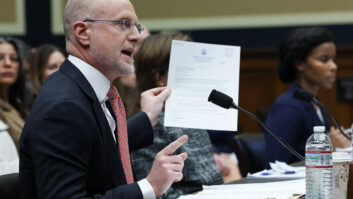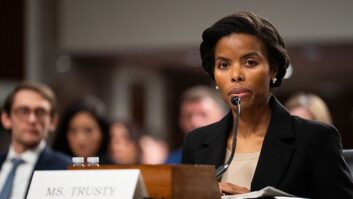LAS VEGAS�Travis LeBlanc, the new FCC Enforcement Bureau chief, is trying to modernize the bureau and use its resources more wisely.
In the past year, one of its highest-profile actions was against Marriott, which was blocking guests� personal hotspots and Wi-Fi at a resort in Tennessee in order to make�them pay for the hotel Wi-Fi,�he said. It was the agency�s�first such blocking case, according to LeBlanc.
The upshot? Now, �almost every hotel chain has gotten rid of that type of blocking� for members of their rewards programs, he said.
Another high-profile case involved a telephone compa- ny in California that rerouted all 911 calls to voicemail for several months. The agency stopped that. �We can�t have 911 susceptible to voicemail,� said LeBlanc.
Turning to broadcast issues, LeBlanc told moderator and former Enforcement Bureau Chief David Solomon that the commission now doesn�t turn every complaint it receives into a case; it takes many things into consideration, including input from broadcasters, in order to make decisions faster.
As for indecency actions, LeBlanc joked that he doesn�t enjoy the Super Bowl or awards ceremonies as much now that he�s the bureau chief, �because I�m always worried!� He referenced recent indecency actions, most notably an approximately $20,000 broadcast enforcement in New York on Tuesday.
Then he turned to radio piracy and to broadcaster concerns that the pirate problem will be exacerbated by a bureau plan to reduce the number of field bureau of- fices and agents dramatically. He likened fighting pirates to playing Whac-a-Mole; the agency may force a pirate off the air but it turns up again six months later. �We want to get to a world where there are no pirates on the airwaves,� said LeBlanc, who said he�s looking forward to working with the NAB and broadcasters on that.
He characterized the management of field offices as �one of the most challenging [issues] for me� and said he grappled for months with the question reducing their footprint. The current plan is to reduce the number of offices by more than�half, to eight. But morale in the field was low, he said, and no one was being replaced in field offices thanks to a �flatlined budget� when he arrived. He said that �over 50 percent� of field agents are eligible for retirement.
Under the proposal, broadcasters would send problems to a field director in Washington rather than regional offices. This director would be a full-time person, he said, whereas the work is one of many duties a deputy chief handles now, according to LeBlanc.
He stressed that the agency will continue to �assess if we need to restructure� the plan and said �that�s certainly on the table.� He said the bureau is �actively engaged with NAB� on the proposal. One small-market broadcaster in the audience asked LeBlanc to rethink the office closure plan, saying that field offices essentially are the face of the commission for many broadcasters. �When that FCC inspector comes in, he�s really the voice of God.�







